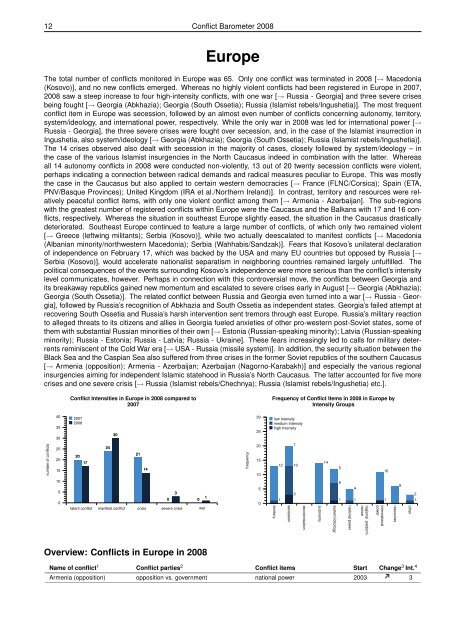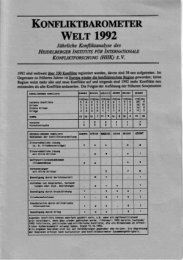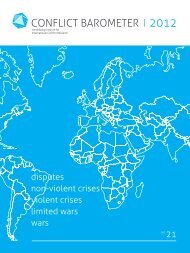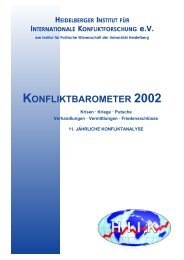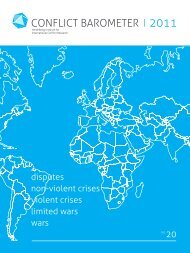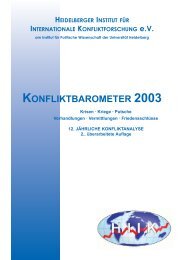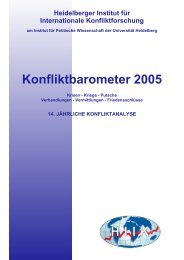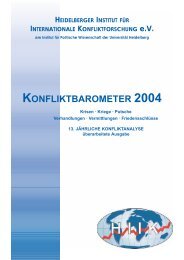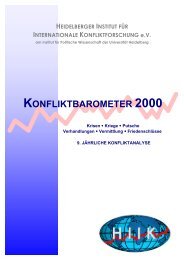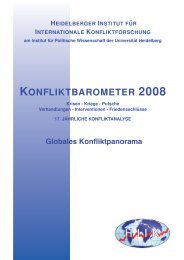CONFLICT BAROMETER 2008
CONFLICT BAROMETER 2008
CONFLICT BAROMETER 2008
You also want an ePaper? Increase the reach of your titles
YUMPU automatically turns print PDFs into web optimized ePapers that Google loves.
12 Conflict Barometer <strong>2008</strong><br />
Europe<br />
The total number of conflicts monitored in Europe was 65. Only one conflict was terminated in <strong>2008</strong> [→ Macedonia<br />
(Kosovo)], and no new conflicts emerged. Whereas no highly violent conflicts had been registered in Europe in 2007,<br />
<strong>2008</strong> saw a steep increase to four high-intensity conflicts, with one war [→ Russia - Georgia] and three severe crises<br />
being fought [→ Georgia (Abkhazia); Georgia (South Ossetia); Russia (Islamist rebels/Ingushetia)]. The most frequent<br />
conflict item in Europe was secession, followed by an almost even number of conflicts concerning autonomy, territory,<br />
system/ideology, and international power, respectively. While the only war in <strong>2008</strong> was led for international power [→<br />
Russia - Georgia], the three severe crises were fought over secession, and, in the case of the Islamist insurrection in<br />
Ingushetia, also system/ideology [→ Georgia (Abkhazia); Georgia (South Ossetia); Russia (Islamist rebels/Ingushetia)].<br />
The 14 crises observed also dealt with secession in the majority of cases, closely followed by system/ideology – in<br />
the case of the various Islamist insurgencies in the North Caucasus indeed in combination with the latter. Whereas<br />
all 14 autonomy conflicts in <strong>2008</strong> were conducted non-violently, 13 out of 20 twenty secession conflicts were violent,<br />
perhaps indicating a connection between radical demands and radical measures peculiar to Europe. This was mostly<br />
the case in the Caucasus but also applied to certain western democracies [→ France (FLNC/Corsica); Spain (ETA,<br />
PNV/Basque Provinces); United Kingdom (IRA et al./Northern Ireland)]. In contrast, territory and resources were relatively<br />
peaceful conflict items, with only one violent conflict among them [→ Armenia - Azerbaijan]. The sub-regions<br />
with the greatest number of registered conflicts within Europe were the Caucasus and the Balkans with 17 and 16 conflicts,<br />
respectively. Whereas the situation in southeast Europe slightly eased, the situation in the Caucasus drastically<br />
deteriorated. Southeast Europe continued to feature a large number of conflicts, of which only two remained violent<br />
[→ Greece (leftwing militants); Serbia (Kosovo)], while two actually deescalated to manifest conflicts [→ Macedonia<br />
(Albanian minority/northwestern Macedonia); Serbia (Wahhabis/Sandzak)]. Fears that Kosovo’s unilateral declaration<br />
of independence on February 17, which was backed by the USA and many EU countries but opposed by Russia [→<br />
Serbia (Kosovo)], would accelerate nationalist separatism in neighboring countries remained largely unfulfilled. The<br />
political consequences of the events surrounding Kosovo’s independence were more serious than the conflict’s intensity<br />
level communicates, however. Perhaps in connection with this controversial move, the conflicts between Georgia and<br />
its breakaway republics gained new momentum and escalated to severe crises early in August [→ Georgia (Abkhazia);<br />
Georgia (South Ossetia)]. The related conflict between Russia and Georgia even turned into a war [→ Russia - Georgia],<br />
followed by Russia’s recognition of Abkhazia and South Ossetia as independent states. Georgia’s failed attempt at<br />
recovering South Ossetia and Russia’s harsh intervention sent tremors through east Europe. Russia’s military reaction<br />
to alleged threats to its citizens and allies in Georgia fueled anxieties of other pro-western post-Soviet states, some of<br />
them with substantial Russian minorities of their own [→ Estonia (Russian-speaking minority); Latvia (Russian-speaking<br />
minority); Russia - Estonia; Russia - Latvia; Russia - Ukraine]. These fears increasingly led to calls for military deterrents<br />
reminiscent of the Cold War era [→ USA - Russia (missile system)]. In addition, the security situation between the<br />
Black Sea and the Caspian Sea also suffered from three crises in the former Soviet republics of the southern Caucasus<br />
[→ Armenia (opposition); Armenia - Azerbaijan; Azerbaijan (Nagorno-Karabakh)] and especially the various regional<br />
insurgencies aiming for independent Islamic statehood in Russia’s North Caucasus. The latter accounted for five more<br />
crises and one severe crisis [→ Russia (Islamist rebels/Chechnya); Russia (Islamist rebels/Ingushetia) etc.].<br />
Conflict Intensities in Europe in <strong>2008</strong> compared to<br />
2007<br />
Frequency of Conflict Items in <strong>2008</strong> in Europe by<br />
Intensity Groups<br />
40<br />
35<br />
30<br />
2007<br />
<strong>2008</strong><br />
30<br />
30<br />
25<br />
low Intensity<br />
medium Intensity<br />
high Intensity<br />
number of conflicts<br />
25<br />
20<br />
15<br />
20<br />
17<br />
24<br />
21<br />
14<br />
frequency<br />
20<br />
15<br />
10<br />
12<br />
7<br />
10<br />
14<br />
5<br />
10<br />
10<br />
5<br />
0<br />
3<br />
0 0<br />
latent conflict manifest conflict crisis severe crisis war<br />
1<br />
5<br />
0<br />
territory<br />
1<br />
secession<br />
3<br />
decolonisation<br />
autonomy<br />
system/ideology<br />
6<br />
4<br />
1 1 1<br />
1<br />
national power<br />
regional predominance<br />
international<br />
power<br />
resources<br />
6<br />
other<br />
2<br />
Overview: Conflicts in Europe in <strong>2008</strong><br />
Name of conflict 1 Conflict parties 2 Conflict items Start Change 3 Int. 4<br />
Armenia (opposition) opposition vs. government national power 2003 3


